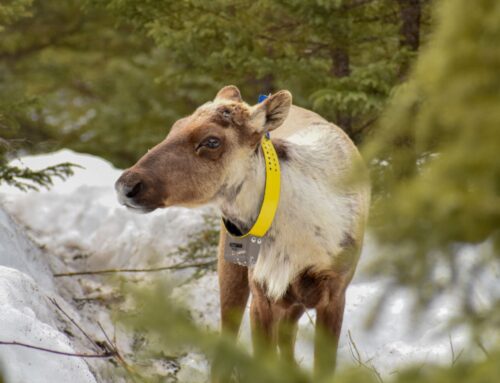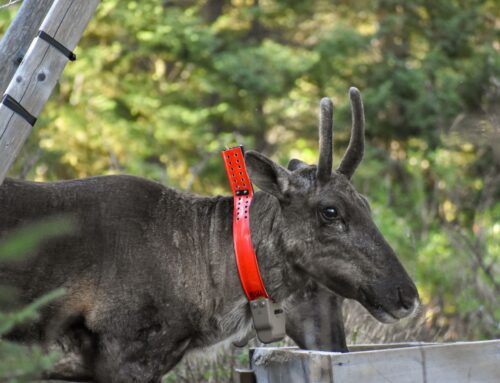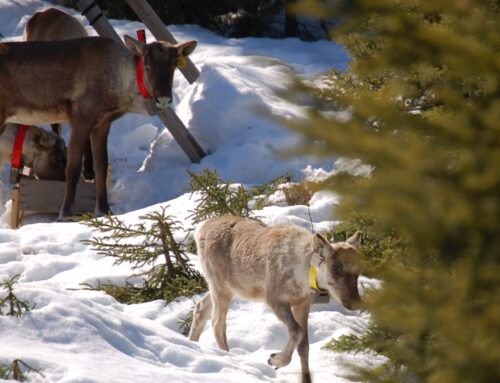Source: Council of the Anishnabe Nation of Lac Simon
Published on December 15, 2019
After the zoo, the slaughterhouse… This is what we understood from recent statements by the Minister of Forests, Wildlife and Parks (MFFP). It should be recalled that in 2018, the Lac Simon First Nation (“Lac Simon”), in partnership with the Long Point and Kitcisakik First Nations, concluded a Contribution Agreement (“Agreement”) with the federal government, in collaboration with the provincial government. This Agreement was to make it possible to put in place concrete measures to protect and safeguard the caribou population in Val-d’Or. The provincial government subsequently undertook to “continue discussions with the Government of Canada in order to develop and conclude an agreement between our respective organizations for the implementation of a long-term strategy for the protection and management of woodland caribou habitat”.1 For the First Nations involved, this Agreement represented a strong and firm commitment on the part of both levels of government to save the Val-d’Or caribou population.
However, we learned with amazement in the media last Wednesday that Mr. Pierre Dufour, Minister of the MFFP, suggested that populations of less than fifty (50) animals should be abandoned. On the one hand, this statement denies his government’s commitments to the federal government and First Nations and, on the other hand, calls into question the amounts and time invested in the signing of this Agreement.
In doing so, Minister Dufour is deliberately flouting the rights of indigenous peoples to self-determination and to maintain the cultural and natural elements that are the foundations of their identity, as recognized by the United Nations Declaration on the Rights of Indigenous Peoples. This Declaration, which is fundamental to the recognition of the rights of First Nations and Inuit, was adopted by a unanimous motion in the National Assembly on October 8, 2019, as recommended by the report of the Viens Commission.
In this context, the progressive disappearance of the Val-d’Or caribou would be considered by Lac Simon as an infringement of its ancestral rights. Must we recall that First Nations are an important pillar in the responsible and sustainable management of ecosystems, for the well-being of present and future generations, especially in a context where the environment has never been so much at the heart of popular and scientific concerns? Yet, Minister Dufour seems to prioritize the rights of vacationers, workers and industry (forestry, recreation and tourism), to the detriment of First Nations’ ancestral rights, as recognized by the Supreme Court of Canada.
For Ms. Adrienne Jérôme, Chief of Lac Simon, this situation is unacceptable: “It is completely unacceptable to watch the situation of the caribou deteriorate before our eyes until it reaches a critical level and then to say that it is too late to do anything about it. Especially since the Quebec government has known for a very long time that the land regime it is putting in place in the caribou’s habitat leads directly to its disappearance. »
The reduction of woodland caribou populations is inherent to logging and Minister Dufour cannot deny it. “The “prohibitive costs” associated with saving the woodland caribou to which the Minister refers are the direct consequence of the government’s clearly insufficient efforts to protect the habitat of this animal,” said Geneviève Tremblay, biologist for Lac Simon. Thus, justifying the abandonment of a species on our ancestral territories under the pretext that the costs are prohibitive seems absurd to us, all the more so since an important part of these costs is assumed by the federal government.
Once again, it should be remembered that forests, in addition to serving as a natural environment for wildlife, provide society with multiple benefits: air purification, retention of runoff water, carbon dioxide sequestration, etc2. According to this study, these services can represent up to $1.1 billion for the National Capital Region alone. The loss of these services, however, represents a real and prohibitive cost to society, which no job creation can fill.
Finally, we are of the opinion that the federal government and other First Nations in Quebec and Canada should be concerned about such a position taken by Minister Dufour with regard to small caribou herds, since it suggests that it would be acceptable for all other isolated populations to be left to fend for themselves as well.





